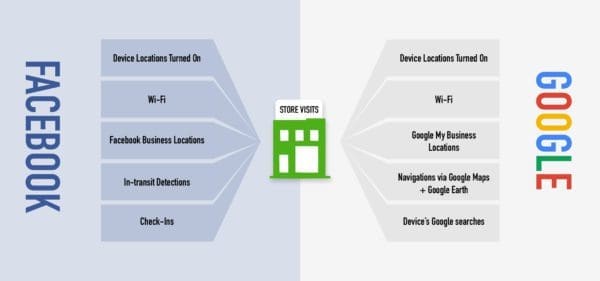Published: June 25, 2019
If you’re a hotel chain, a retailer, an auto dealership or an events venue — anyone with a physical location — we’ve got a metric for you! Analyze digital campaign success using store visits metrics available in Google Ads and on Facebook for B2C companies.
What are store visits?
This metric uses technologies across multiple platforms, tracking people who have interacted with your ads to your physical location. This metric has been available in Google since 2014 and Facebook since 2016, to businesses that meet multiple requirements. Some platform requirements include providing your locations, a certain level of ad spend, sufficient store visit data and more.
How does tracking work?
The actual technology varies by platform, but both Google and Facebook use a combination of location data and behavior to track store visits, including:


How can I use this metric?
We consider this a “bonus” metric. This is a metric you can layer alongside your standard impressions, reach, clicks, landing page views, conversions and more. These metrics compare in a myriad of ways to analyze a campaign, including:
- Ratios of impressions, clicks, conversions, store visits and more across campaigns
- Benchmarking the number of store visits for a campaign that occurs annually or seasonally
- The number of store visits by locations
- The number of store visits compared to store sales
By analyzing these combinations of data, you can see patterns or detect unusually high or low-performing campaigns, keywords, devices, targeted locations, and more.
This metric does a great job at tying advertising to actual foot traffic, especially when you don’t have the advantage of e-commerce or a customer loyalty program. It allows you to get one level closer to truly understanding the business impact of your advertising dollars, beyond that of TV, radio or even other digital advertising tactics.
While it doesn’t define new versus existing customers, there are strategies you can try to help better measure that. Consider excluding remarketing audiences (people who may already be familiar with your brand) to see how the advertising affects new, untapped audiences. We love to leverage this metric to add some robust cross-analysis opportunities to multiple facets of campaigns.
Ready to use store visits to analyze your digital campaigns? Fill out our contact form and let’s chat!



